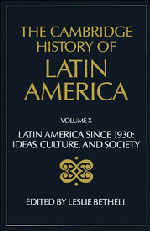Book contents
- Frontmatter
- 1 The multiverse of Latin American identity, c. 1920–c. 1970
- 2 Latin American narrative since c. 1920
- 3 Latin American poetry, c. 1920–1950
- 4 Latin American poetry since 1950
- 5 Indigenous literatures and cultures in twentieth-century Latin America
- 6 Latin American music, c. 1920—c. 1980
- 7 Latin American architecture, c. 1920–c. 1980
- 8 Latin American art since c. 1920
- 9 Latin American cinema
- 10 Latin American broadcasting
- Bibliographical essays
- References
2 - Latin American narrative since c. 1920
Published online by Cambridge University Press: 28 March 2008
- Frontmatter
- 1 The multiverse of Latin American identity, c. 1920–c. 1970
- 2 Latin American narrative since c. 1920
- 3 Latin American poetry, c. 1920–1950
- 4 Latin American poetry since 1950
- 5 Indigenous literatures and cultures in twentieth-century Latin America
- 6 Latin American music, c. 1920—c. 1980
- 7 Latin American architecture, c. 1920–c. 1980
- 8 Latin American art since c. 1920
- 9 Latin American cinema
- 10 Latin American broadcasting
- Bibliographical essays
- References
Summary
introduction
There are many ways in which one can try to encapsulate the process of Latin American fiction, but no point of departure is ultimately more persuasive, given the material conditions of Latin America’s historical experience, than the distinction between an Americanist and a ‘universalist’, or ‘cosmopolitan’, orientation. The Americanist impulse can be traced from the earliest days of Latin American independence, when it took on both a nationalist and an anti-colonial ideology and rhetoric. The cosmopolitan impulse, equally strong, corresponds to a permanent desire to know and understand the global culture within which and against which the Latin American nations have had to define themselves. At the present time, in an era of ‘pluralism’, when even the existence of a recognizable and reasonably homogeneous ‘Latin American’ entity is questioned, such generalizations are not infrequently challenged, but this distinction remains profoundly persuasive as a conceptual tool. It applies within and between periods, and it applies within and between the forms and contents of literary works. To explain why one tendency or the other predominates at any particular time is not easy, but the phenomena themselves are not difficult to identify.
- Type
- Chapter
- Information
- The Cambridge History of Latin America , pp. 129 - 222Publisher: Cambridge University PressPrint publication year: 1995

